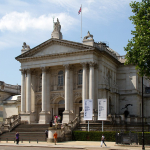Once more unto the breach: arguments against decolonisation
Richard Norrie argues that decolonising universities will produce a poorer curriculum and ever-greater bureaucratic interference. Those who have really put themselves on the line to fight racism, like Nelson Mandela (aged 19, above), were inspired by the very philosophy and literature today’s radicals reject.
We often find ourselves having to get to grips with new forms of political activism that pertain to things that have no precise definition. One such example is ‘decolonisation’, an idea that is sweeping through academia. Universities and academics rush to decolonise their curriculums without any commonly shared understanding of what this means and how we know when it is accomplished. There is no consensus even among supportive scholars, at least judging by some of the literature on the matter.
Nevertheless, there are some common ideas that unite most exponents. Firstly, universities are and were complicit in colonialism and ‘coloniality’, the latter being a mindset or ideology that grants legitimacy to some groups or forms of knowledge at the expense of others. Knowledge is seen as the same thing as power and privilege. It is the view from the top, rather than universal truths, timeless and accessible to all. Decolonisers will speak of ‘power structures’ meaning social hierarchies, which universities are complicit in sustaining. The marginalised are mostly colonised peoples and ethnic minorities – but others, too.
Thus, it is not enough to study the world; following Karl Marx, ‘the point is to change it’. Practical applications in teaching include making colonialism central in all subjects as well as novel research methods that seek to break down the distinction between the researcher and the lives of those researched, teacher and student, echoing earlier radicals like Paulo Friere. New forms of assessment are offered, based on collaboration rather than the individual alone in the examination hall. Reading lists are to be broadened, both to include scholars from groups with little presence in the canon as well as histories and perspectives that may have been overlooked or ignored – diversifying the curriculum.
Disparate outcomes between groups of students are to be closed, led through bureaucratic oversight of departments. All groups are to be present in academia in proportion to their population shares of the country overall. Academic institutions are to examine their past for links to empire and slavery, to acknowledge guilt and pay reparations. Statues or objects deemed ‘problematic’ are to be removed from sight, while buildings are to be renamed if they offend. The line between student or lecturer and activist is intentionally blurred. They are purposely there to advocate for societal change, to change education through what is taught and ultimately re-write our culture to make it one that lifts up allcomers – a culture both just and equitable.
So how far entrenched is decolonisation in British universities? Research from the think tank Civitas, where I work, found 56 per cent of British universities had policies or official statements of support, while 34 per cent showed signs of academics advocating for decolonisation from within. The latter is likely an underestimate. Seven out of 10 British universities had either one or the other.
We were further able to locate decolonisation as part of wider phenomenon that we termed ‘radical progressivism’. A separate study was able to show a decolonising university will be more likely to offer anti-racism training, have free-speech controversies, utilise trigger warnings, endorse the concept of ‘white privilege’, have transgender-related regulation of speech, offer anonymous reporting of harassment, and be a signatory to Advance HE’s Race Equality Charter – a diversity scheme some have criticised as ‘racially divisive’. We also showed these things, including decolonisation, tended to be more present in the top universities as well as where student satisfaction was lowest. The top two radical progressive universities – in common but regrettable parlance, ‘woke’ – were Oxford and Cambridge.
Some observers have pointed out the hypocrisy that so many top universities were willing to make arrangements with Chinese state universities and receive money from Chinese companies, at a time when China openly threatens Taiwan and oppresses ethnic minorities within. As I wrote: ‘Imagine if Cambridge found it had an historic partnership with a hypothetical university in Jamaica in the eighteenth century, funded by plantation owners. What would its attitude be today?’
Why is decolonisation a problem? Without a clear definition or goal, it will engender bureaucratic measures without end as well as heap activist pressure upon academics to conform. In other words, it becomes something akin to a cultural revolution and a threat to academic freedom. Sometimes it is very radical – for example, demanding land reform with universities in places like Australia where land is deemed ‘stolen’. It increases departmental costs, but with little way of gauging if the money is well spent.
At its heart is relativism, meaning all cultures are equal as are all forms of epistemology. But these are not true, in that the Ancient Greeks are venerated for the cultural achievements, not their race. If you look at a philosophy curriculum from Ethiopia – a country with no prolonged experience of colonisation, you will find Plato et al. often as applied to African problems. In other words, the European classics are not a colonial imposition, but of distinct merit that earn the admiration of scholars the world over. There is no reason why a European country would not have a Euro-centric view on the world, while in African universities, you will often find an Afro-centric take on a Euro-centric canon. Indeed, you will find some of the most self-destructive elements of Western culture present, too, namely Marxism and its progeny Critical Theory.
Consider the following quotation from the Dutch-Surinamese academic Gloria Wekker,
‘A decolonised university and society is a post-racial one. However, in order to achieve post-racism, we first need to reach a situation where everybody is aware of race and prepared to act on that knowledge.’
In this view, the point is to make everything about race in the hope that somehow, we will stop making things about race. You wonder how we would ever stop, finding a way beyond an impasse of resentment and recrimination in which no one is prepared to budge. The reason for this is that dominant groups are made up of individuals who for the most part, have done nothing wrong and refuse to accept their allotted place as objects of suspicion, shame and guilt.
Moreover, groups going into universities are already unequal in terms of accomplishments, with fewer whites in Britain going to university meaning greater selectivity with better academic performance reasonable to expect. As Thomas Sowell has pointed out, it is a mistake to assume the cause of any given disparity is to be found in the place where the statistics are collected, meaning attempts to micromanage academic culture may be wasteful, disruptive and, in the absence of any meaningful objectives, tend towards self-service.
Critics of decolonisation need to have something to offer in place to students. Clearly, the popularity of decolonisation shows there is genuine goodwill to make things more inclusive. But the reach for radical measures, untried and untested, reveals that there is little faith in the existing ideals and institutions of academia. Why do we look for a radical bureaucratic imposition of other ideas and perspectives rather than admit scholars have the freedom to put them forward, to be heard and to be contested in debate, scholarship, lectures, and seminars? Surely, that is the way forward; for advocates of overlooked scholars and scientists to make their case. Academic freedom means the freedom to compete in the great battle of ideas, and clearly you see ethnic minorities making their mark, particularly in science. It also means freedom from political activists and radicalised bureaucrats.
Consider England – its literature traced back to Germanic settlers, its religion introduced by Roman colonisers, its society imposed bloodily during the Norman conquest, with innocence or guilt judged by a jury of 12 courtesy of Viking invaders. Now consider Reading Revolution by Ashwin Desai, which details the education gained by political prisoners on Robben Island during the Apartheid era in South Africa. The book describes how men under extreme conditions empowered themselves through an education based largely on European literature, ultimately to throw off their oppression and take back control of their country. Shakespeare, in particular, proved inspirational. Sonny Venkatrathnam’s copy of The Complete Works, initially confiscated by guards but reobtained through quick thinking (‘look there’s the Bible by William Shakespeare’) was circulated widely, with prisoners signing their names by their favourite passages. Nelson Mandela signed ‘Cowards die many times before their deaths: The valiant never taste death but once’ from Julius Caesar.
Desai writes,
‘According to [Ahmed] Kathrada, “somehow Shakespeare had something to say to us” on Robben Island, though he once tried to “argue that Shakespeare was a racist”. He laughed as he recounted that little did he know he was talking to the likes of Dennis Brutus and Neville Alexander, who were steeped in literature and they quickly “put me in my place”.’
This is what actual anti-racist activists do with themselves, who risked their lives and paid the price of sometimes decades’ incarceration, compared to student radicals, overgrown or otherwise who risk very little. Kathrada’s prize possessions were his Oxford Book of English Verse and Shakespeare’s Complete Works, which he had kept with him through six prisons.
Culture and colonialism are sometimes impossible to separate – what is introduced as foreign culture ultimately becomes indigenous, improving nations’ means to express themselves, to imagine themselves, this being the core to their resistance to those who would oppress them. It cannot be undone, only quashed. Colonisation is possible with better technology and more efficient production, but such societies also develop more sophisticated forms of culture. Empires always have the best stuff, but it can be readily consumed by the colonised, and made their own. It is what the English did. ‘Once more unto the breach’ will always win out over ‘decolonise the curriculum’, irrespective of who is uttering it. Decolonisation would bring about a new canon which might satisfy feelings of guilt and resentment, but will leave us with a political imposition where a culture ought to be, that fires nothing and inspires no one worth their salt.
Richard Norrie is a researcher at the think tank Civitas. He is author of two reports Free Speech and Decolonisation in British Universities and The Radical Progressive University Guide.


